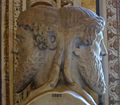Water: 2016 Retrospective (and Issues to Watch in 2017)
At this time of year it seems appropriate to both examine the year just ended and look forward to the one to come.[1] 2016 brought numerous  developments in the water law and policy sector at the national and state levels, and also here at Marquette University Law School’s Water Law and Policy Initiative. 2017 promises more of the same.
developments in the water law and policy sector at the national and state levels, and also here at Marquette University Law School’s Water Law and Policy Initiative. 2017 promises more of the same.
Nationally, the Flint drinking water crisis continued to dominate headlines. While the quality of Flint’s drinking water is slowly improving, it’s certainly too early to declare the crisis over. As a stark reminder of that, an ongoing investigation led to a series of criminal charges against those at the heart of the disaster. Here at Marquette, drinking water issues also took center stage. The Water Law & Policy Initiative’s September Public Policy and American Drinking Water conference, organized in combination with the Law School’s larger Public Policy Initiative, drew widespread attention and brought together national experts in a variety of water-related fields. It was at this event that Mayor Barrett spoke of the pressing risks of lead in Milwaukee because of the 70,000 lead laterals serving City of Milwaukee residences. The mayor’s comments at and after the conference provoked intense media coverage and quickly resulted in the City making numerous policy changes. For example, Mayor Barrett agreed to provide free water filters to affected citizens, and ultimately budgeted to pay a substantial part of the cost to replace (privately owned) lead service lines.
Many other stories also captured headlines in 2016.

